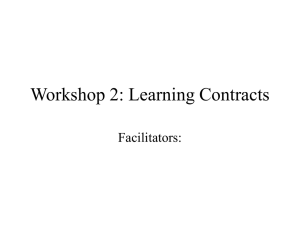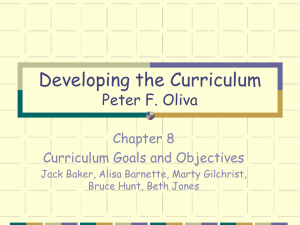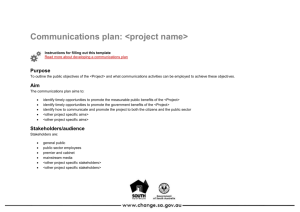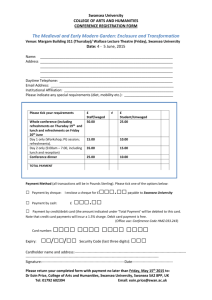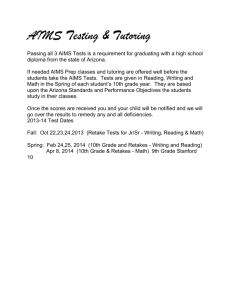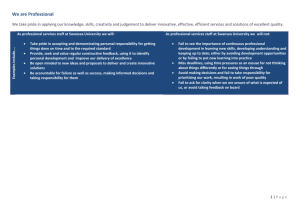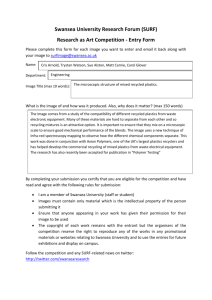Template for your “Formal Rules”
advertisement
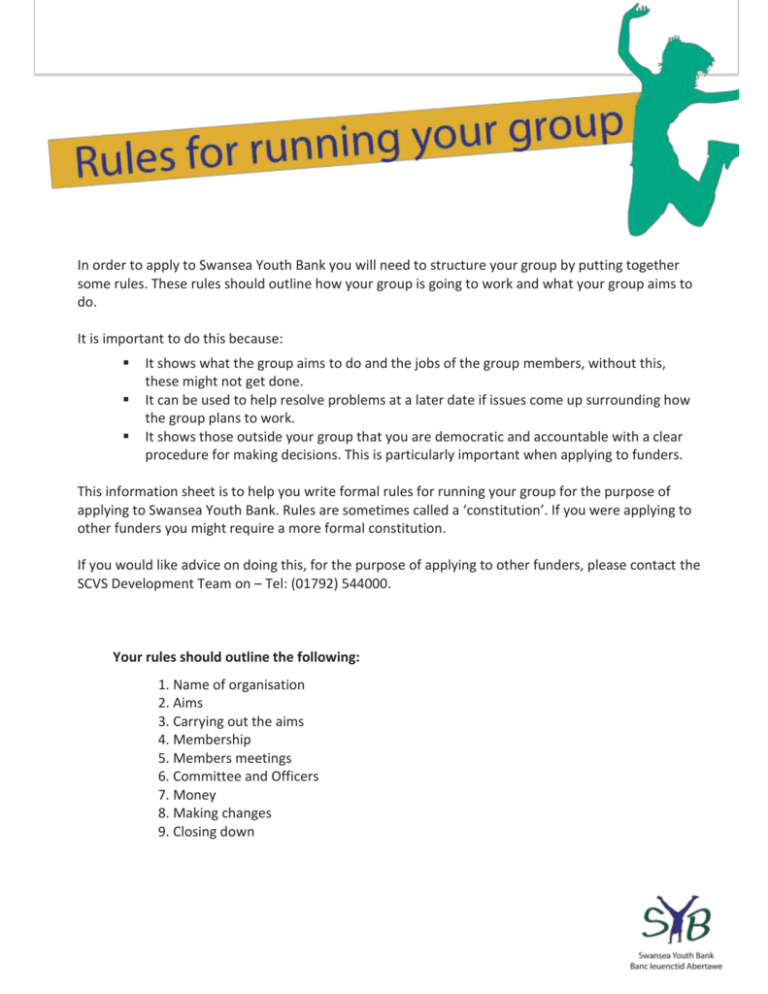
In order to apply to Swansea Youth Bank you will need to structure your group by putting together some rules. These rules should outline how your group is going to work and what your group aims to do. It is important to do this because: It shows what the group aims to do and the jobs of the group members, without this, these might not get done. It can be used to help resolve problems at a later date if issues come up surrounding how the group plans to work. It shows those outside your group that you are democratic and accountable with a clear procedure for making decisions. This is particularly important when applying to funders. This information sheet is to help you write formal rules for running your group for the purpose of applying to Swansea Youth Bank. Rules are sometimes called a ‘constitution’. If you were applying to other funders you might require a more formal constitution. If you would like advice on doing this, for the purpose of applying to other funders, please contact the SCVS Development Team on – Tel: (01792) 544000. Your rules should outline the following: 1. Name of organisation 2. Aims 3. Carrying out the aims 4. Membership 5. Members meetings 6. Committee and Officers 7. Money 8. Making changes 9. Closing down A. THE GROUP’S NAME. If a shortened version is used please include this also. E.g. – Swansea Youth Bank (SYB) B. THE AIMS OF THE GROUP. These are brief overall statements about what the group wants to achieve in the long term. They should include who you are trying to benefit and how you will do this and what area you are working in. For example: to provide learning experiences for young people aged 11-25 to benefit the wider community of Swansea to enable young people to access youth led grants C. CARRYING OUT THE AIMS. This is a list of things the group may do to achieve its aims. This should cover everything the group might need to do such as recruit volunteers to help the group achieve its aims apply to funders for grants to keep the project going distribute grants publicise funds available D. MEMBERSHIP OF THE GROUP. This should be open to everyone, unless there is good reason why this is not the case. However, it may be open to people from a particular community, all volunteers of the project or all those who support the aims of the group. For example, woman’s aid centres are only open to women and some groups are only open to young people or children. It is also good practice to include a statement about equal opportunities, such as: The group will not discriminate on the grounds of gender, race, colour, ethnic or national origin, sexuality, disability, religious or political belief, marital status or age.” Please state who is able to join the group and how they can do this. It could be that an individual has to fill in a form to become a member. It is useful to have a members list so that you know who to contact when calling meetings and who is able to vote at meetings. How will membership be renewed? How does someone leave the group? Is it that people stop being members when they reach a certain age, move out of the area or do something that goes against the aims of the group? E. MEMBERS MEETINGS. Annual General Meeting One formal meeting should be held of members each year; this is called an Annual General Meeting (AGM) and you will need a certain amount of members to attend. At this meeting you would report on the work you have carried out during the year, give the treasurers report, elect new members of important roles and talk about your plans for the Rules for running your group for Swansea Youth Bank Applicants future. These meetings are also a space where changes to the rules can be made. It might also be an opportunity to recognise the contributions of volunteers over the past year. You will need to say in your rules when this meeting will be held, how much notice must be given to members, and the minimum amount of members that must attend so that important decisions can be reached. Committee Meetings These are the meetings you will have regularly with the committee members in order to carry out the purposes you have put in section B. You will need to say how often the group is going to meet, who will be responsible for calling the meeting and the amount of notice that must be given when calling a meeting. When giving out information regarding meetings be sure to include the date, time, venue and plan of what you will do during the meeting (agenda) Quorum This is the minimum amount of people you will require to make a decision on behalf of the group. (Either at committee meeting or AGM) You will need to explain what would be done if there were not enough members of the group present. Usually in this case, the meeting would be moved to the following week at the same time and hope that more members attend. Running the meetings It is useful to think about any rules you might like for the meetings that you have. Take time to discuss this with your group. For example, rules might include, listening to each other, hand up to answer question, mobiles off, stick to the agenda. F. COMMITTEE AND OFFICERS Some groups are run by a committee which is elected once a year and is responsible for the day to day running of the group. Other groups share or rotate the jobs. Those that take on the tasks such as these are referred to as the management committee and usually have the roles of Chair, Secretary and Treasurer. You will need to say how members get these roles. It could be that they are voted in by other members. It can be good practice to write a ‘task’ description for the role. Other roles may be given to other members, such as, press officer, fundraiser, project evaluator. These members are called officers. You could run your group without a committee where the entire group is responsible for the groups aims and tasks. However, it is still useful to have one member in charge of important issues such as recording how money is being spent. If you have a different chair at each meeting, it is useful for that person to know in advance and if there is a specific task that needs doing it is useful to decide who will be responsible for making sure it gets done. Rules for running your group for Swansea Youth Bank Applicants Other points to consider If someone is given a role, how long can they do it for? It is good to make it fixed period of time (e.g. 6 months) so that other members can have a go at that role and give the other person a break It is a good idea to have a plan in case someone leaves the group as you would need some one to take on their role In some situations you may need to stop a member from the role that they are doing, if they are behaving inappropriately. How would you go about ending their role? It is common for members to vote on this. G. MONEY You will need to explain how you intend to deal with any money in possession of the group Funds raised should only be used to further the aims of the group The treasurer is responsible for keeping a record of the finances, what money comes in to the group, what money is used and on what and preparing a record for the funders and feedback to the groups members. You will need to say when your financial year will end, this may be March 31 st (end of the tax year) or a year from when you first receive funding If expenses are to be paid to members you will need to say the type of expenses (e.g. travel, childcare, food) and they must be actual expenses. Please note that no personal financial gain or profit must be gained through the funding that you receive and you should say that clearly in your constitution. H. MAKING CHANGES Hopefully you will have given enough thought to your rules when writing them that you will not need to make changes. However, in the instance that you may need to make changes, what will be your procedure? Normally a meeting would be called and a percentage (which you decide) of the members must agree the changes for them to be made. How much notice of this meeting needs to be given? I. CLOSING DOWN To close down the group you would need a percentage of members to agree this. (You need to decide on a minimum number or percentage of the groups total) You will also need to state what would happen to the remaining funds/assets when the group ended. It is a requirement that the money should be paid to another group with similar aims. ADOPTING THE RULES The rules should be agreed by as many members as possible at a group meeting. It should then be signed and dated by the chair, secretary or a representative of those present at the meeting. Rules for running your group for Swansea Youth Bank Applicants You will need to state the date the rules are adopted and the date for an AGM one year from then. Please note: Make sure you file your rules somewhere safe and that all key members have a copy for their reference. Rules for running your group for Swansea Youth Bank Applicants

